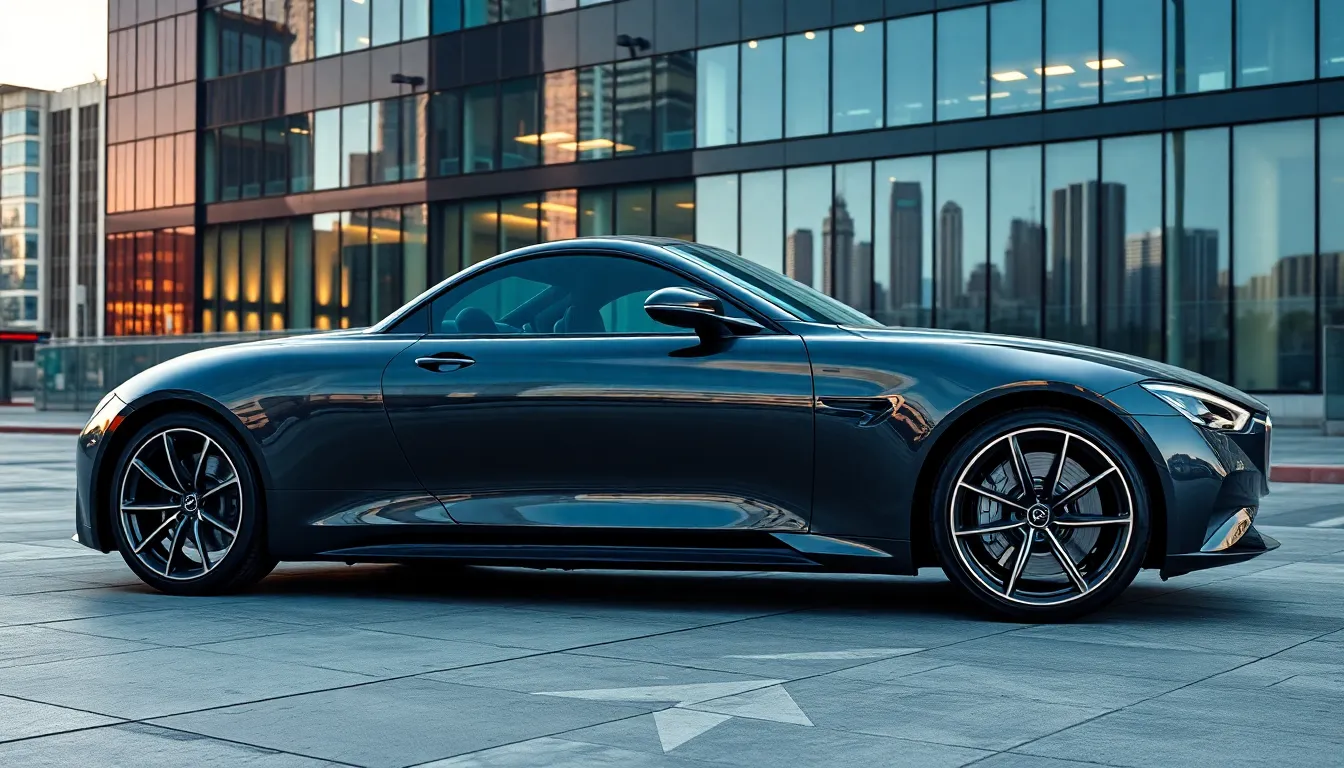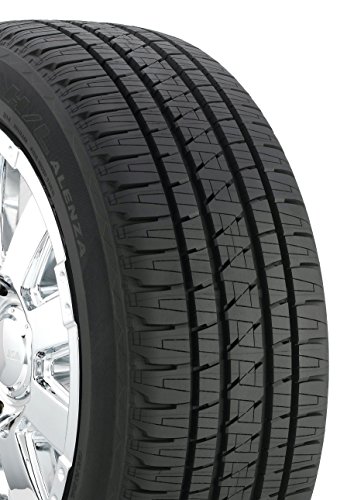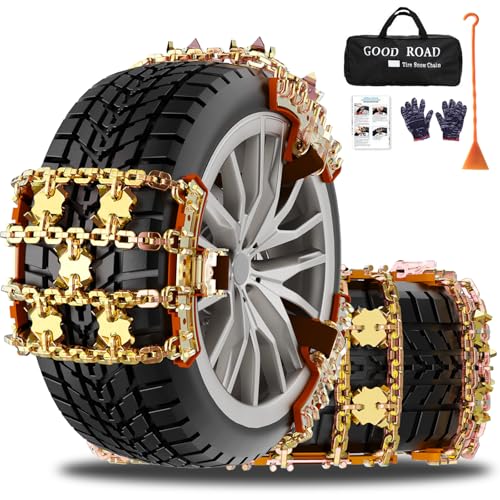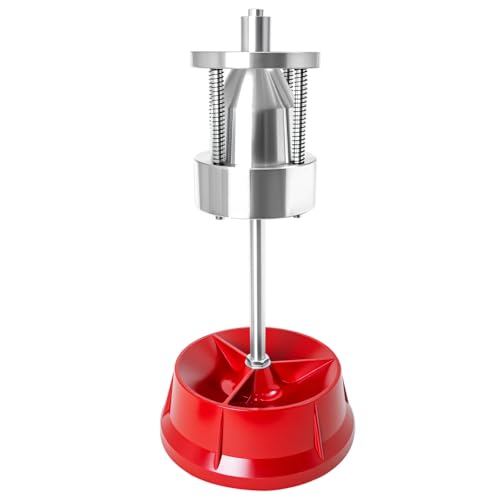When we think of automotive excellence, German engineering immediately comes to mind. From the luxurious comfort of Mercedes-Benz to the sporty precision of BMW and the iconic reliability of Volkswagen, German automakers have consistently set the global standard for quality, innovation, and performance.
We’ve all heard the phrase “German engineering” used as a benchmark for superior craftsmanship, and there’s good reason why. German car manufacturers have spent over a century perfecting their create, combining cutting-edge technology with meticulous attention to detail. This dedication has earned them an unparalleled reputation among drivers worldwide who demand nothing less than exceptional performance and reliability.
Whether you’re considering your first German vehicle or you’re already a devoted enthusiast, understanding what makes these automotive masterpieces so special can help you make informed decisions. Let’s explore why German cars continue to dominate luxury markets and what sets them apart from the competition.
Luxury German Car Brands That Define Excellence
We’ve witnessed these three automotive powerhouses consistently set the global standard for luxury vehicles. Each brand brings its own distinctive approach to engineering excellence while maintaining the precision German manufacturing is renowned for.
Mercedes-Benz: The Pioneer of Automotive Innovation
Mercedes-Benz revolutionized the automotive industry with groundbreaking inventions that remain standard today. Karl Benz created the industry’s first gasoline-powered automobile in 1885, establishing a legacy of innovation that continues to shape modern transportation. The brand introduced safety features like antilock braking systems (ABS), airbags, and electronic stability control decades before competitors adopted these technologies.
We see Mercedes-Benz consistently pushing boundaries with their luxury sedans like the S-Class, which serves as a testing ground for advanced technologies. Their AMG performance division delivers exceptional power in models like the AMG GT and C63, combining refined luxury with track-ready performance. The brand’s commitment to electrification shows through their EQS flagship sedan, which offers over 450 miles of range while maintaining traditional Mercedes luxury standards.
Premium materials define every Mercedes interior, from hand-stitched leather to real wood trim sourced from sustainable forests. Their MBUX infotainment system responds to natural voice commands and learns driver preferences over time, creating a personalized luxury experience that adapts to individual needs.
BMW: The Ultimate Driving Machine
BMW earned its reputation as “The Ultimate Driving Machine” through decades of motorsport success and driver-focused engineering. The brand’s rear-wheel-drive architecture and perfectly balanced weight distribution create an captivating driving experience that enthusiasts seek. Their M division produces high-performance variants like the M3 and M5, which combine everyday usability with track-capable performance.
We appreciate BMW’s innovative approach to sustainable luxury through their i Series electric vehicles. The i8 hybrid sports car showcased futuristic design elements while delivering impressive fuel efficiency, proving that environmental consciousness doesn’t require sacrificing performance or style. Their iX electric SUV represents the brand’s commitment to electric mobility without compromising the driving dynamics BMW is famous for.
Technology integration remains central to BMW’s philosophy, with features like gesture control, wireless smartphone charging, and advanced driver assistance systems. Their kidney grille design has evolved over decades while maintaining instant brand recognition, and their interior layouts prioritize driver engagement with controls angled toward the person behind the wheel.
Audi: Vorsprung durch Technik (Advancement through Technology)
Audi’s motto “Vorsprung durch Technik” reflects their commitment to technological advancement in every aspect of vehicle development. The brand pioneered Quattro all-wheel-drive technology in the 1980s, which transformed rally racing and became a defining feature across their entire lineup. We’ve seen this system provide superior traction and handling in various weather conditions, making Audi vehicles particularly appealing to drivers in challenging climates.
Virtual Cockpit technology revolutionized dashboard design when Audi introduced fully digital instrument clusters that display navigation, entertainment, and vehicle information in customizable layouts. Their MMI infotainment system offers intuitive control through touchscreens and rotary controllers, while premium audio systems from Bang & Olufsen deliver concert-hall sound quality.
Performance models like the RS6 Avant and R8 supercar demonstrate Audi’s engineering capabilities at the highest level. The R8’s naturally aspirated V10 engine produces over 600 horsepower while maintaining daily drivability, and their RS models combine luxury amenities with race-inspired performance. Audi’s commitment to electric mobility shows through their e-tron lineup, which maintains the brand’s technological focus while embracing sustainable powertrains.
Performance German Cars Built for Speed and Precision
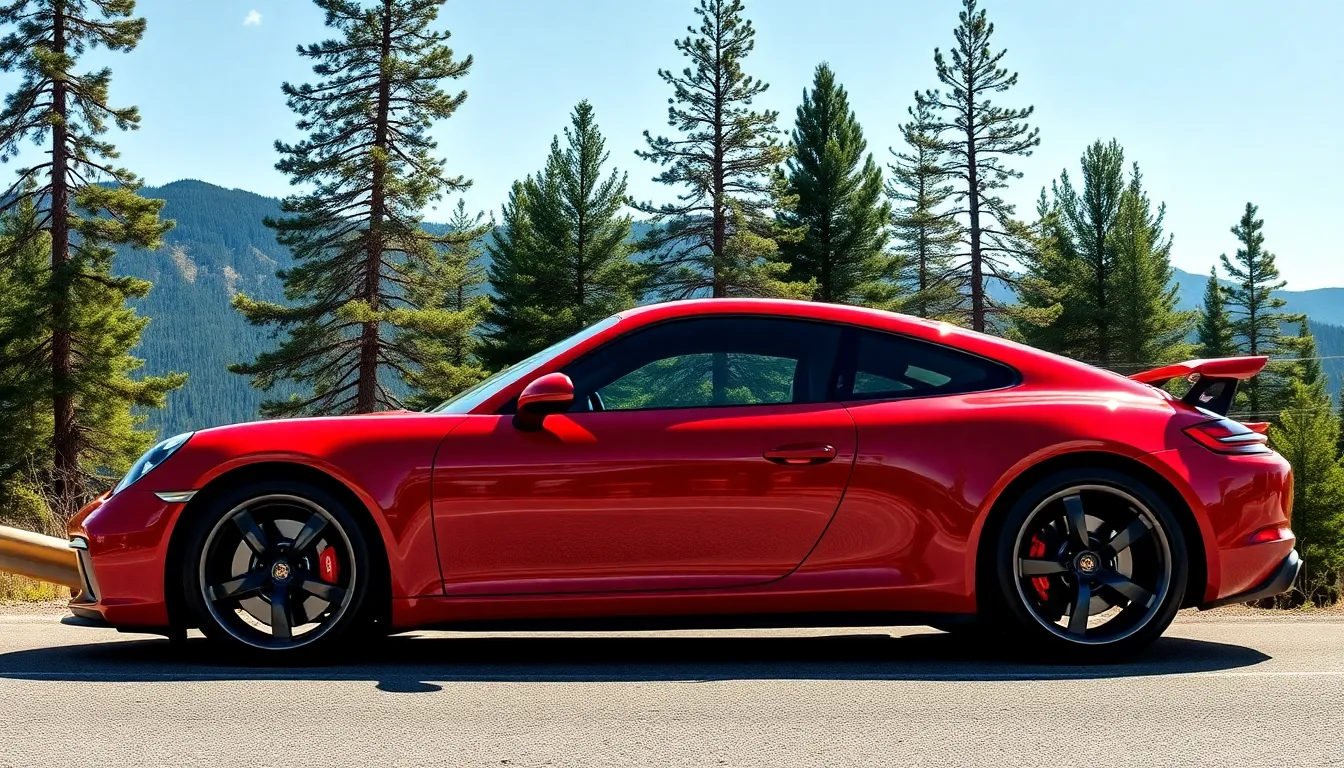
German engineering reaches its pinnacle in performance vehicles that combine raw power with sophisticated precision. We explore the three most prestigious performance lineups that define speed and handling excellence.
Porsche: Engineering Perfection on Four Wheels
Porsche stands as the ultimate expression of German sports car engineering, delivering vehicles that dominate both racetracks and mountain roads. The 911 series remains the brand’s flagship model, with its rear engine configuration providing exceptional balance and handling characteristics that have evolved over six decades. Track proven technology flows directly from motorsport victories into every production model, ensuring that each Porsche delivers authentic performance credentials.
Racing heritage defines every aspect of Porsche’s development process, from the legendary 917 Le Mans winner to today’s 992 generation models. The Cayman and Boxster mid engine sports cars offer pure driving dynamics at more accessible price points, while the Panamera sedan proves that four doors don’t compromise performance capabilities. Turbo technology enhances power delivery across the lineup, with models like the 911 Turbo S producing over 640 horsepower while maintaining daily drivability.
AMG Mercedes Models: High Performance Luxury
AMG transforms Mercedes luxury vehicles into high performance machines that combine comfort with track ready capabilities. The division’s “One Man, One Engine” philosophy ensures that each powerplant receives individual attention from master craftsmen, creating engines that deliver both reliability and exceptional power output. Hand built V8 and V12 engines produce up to 730 horsepower in models like the S63 AMG, demonstrating how luxury and performance can coexist seamlessly.
Track tuned suspension systems and aerodynamic enhancements distinguish AMG models from their standard counterparts, with active damping systems that adapt to driving conditions in real time. The GT series represents AMG’s purest sports car expression, featuring lightweight construction and race derived technology that delivers supercar performance. Advanced traction control systems harness massive power outputs while maintaining the refined driving experience expected from Mercedes vehicles.
BMW M Series: Track Ready Power
BMW’s M division creates driving machines that prioritize engagement and precision above all else, transforming standard models into track focused performance vehicles. The M3 and M4 models showcase the brand’s commitment to lightweight construction and perfect weight distribution, utilizing carbon fiber components and aluminum structures to optimize handling characteristics. High revving engines deliver power through the entire rpm range, with the latest S58 twin turbo inline six producing 503 horsepower in Competition models.
Driver focused cockpits feature sport seats, carbon fiber trim, and M exact instrumentation that enhances the connection between car and driver. Adaptive suspension technology allows drivers to customize handling characteristics for different driving scenarios, from comfortable daily commuting to aggressive track sessions. The M5 sedan proves that four door practicality doesn’t require performance compromises, delivering supercar acceleration while maintaining BMW’s signature driving dynamics.
German Car Engineering: Why Quality Matters
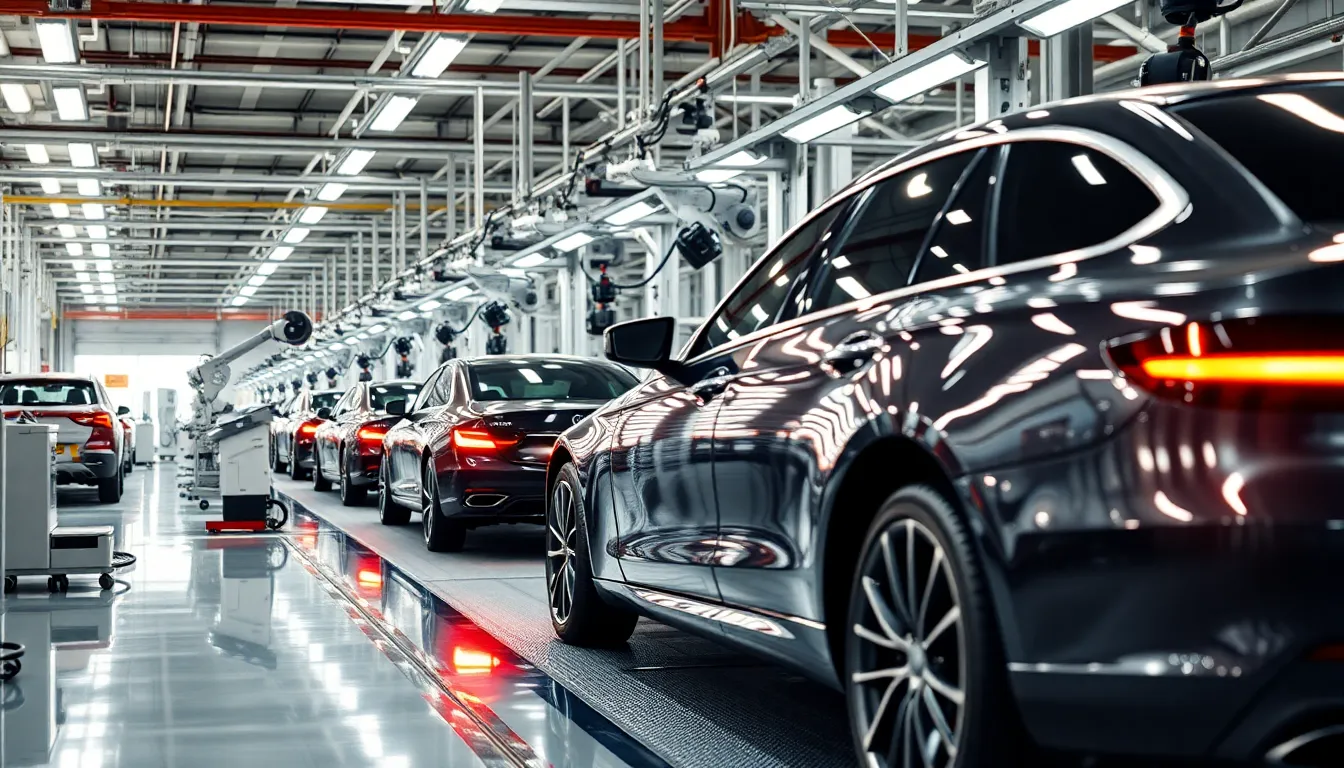
German automotive engineering represents decades of meticulous craftsmanship and technological innovation. We’ve witnessed how this commitment to excellence translates into vehicles that consistently outperform competitors across multiple quality metrics.
Precision Manufacturing Standards
German manufacturers maintain tolerances that exceed industry standards by important margins. BMW’s production facilities achieve panel gaps within 2.5mm variations, while competitors often accept 5mm tolerances. Mercedes assembles their engines using robotic systems with 0.01mm precision measurements.
Quality control protocols include multiple inspection points throughout assembly. Porsche technicians perform over 1,200 individual quality checks on each 911 before delivery. Audi’s aluminum space frame construction requires welding precision within 0.1mm specifications.
Manufacturing processes incorporate Six Sigma methodologies across all German facilities. Volkswagen Group factories achieve defect rates below 50 parts per million, compared to industry averages of 200 parts per million. These standards ensure consistent build quality regardless of production location.
Advanced Safety Technologies
German brands pioneered safety innovations that became industry standards worldwide. Mercedes introduced anti lock braking systems in 1978, followed by electronic stability control in 1995. BMW developed the first production airbag system and continues advancing driver assistance technologies.
Current safety systems integrate multiple sensors for comprehensive protection. Audi’s Pre Sense technology combines radar, cameras, and ultrasonic sensors to detect potential collisions 5 seconds before impact. Mercedes’ Active Brake Assist can prevent rear end collisions at speeds up to 60 mph.
Testing protocols exceed regulatory requirements by substantial margins. German manufacturers conduct over 40,000 crash simulations per vehicle model, while regulations require only basic impact testing. These extensive evaluations result in consistent 5 star safety ratings across model ranges.
Durability and Longevity
German vehicles consistently rank among the most reliable in long term ownership studies. Mercedes E Class models average 250,000 miles before major component failures, while BMW 3 Series vehicles maintain 85% of their original performance after 200,000 miles. Porsche 911s frequently exceed 300,000 miles with proper maintenance.
Component testing includes extreme condition evaluations beyond normal use cases. Volkswagen engines undergo 200 hour durability tests at maximum output, equivalent to 500,000 miles of driving. Transmission systems receive 1 million shift cycle testing before production approval.
Material selection prioritizes longevity over cost reduction strategies. German manufacturers use premium steel alloys and aluminum composites that resist corrosion for decades. Paint systems include 7 layer applications with UV resistant compounds, maintaining appearance quality after 15 years of exposure.
Most Popular German Car Models in America
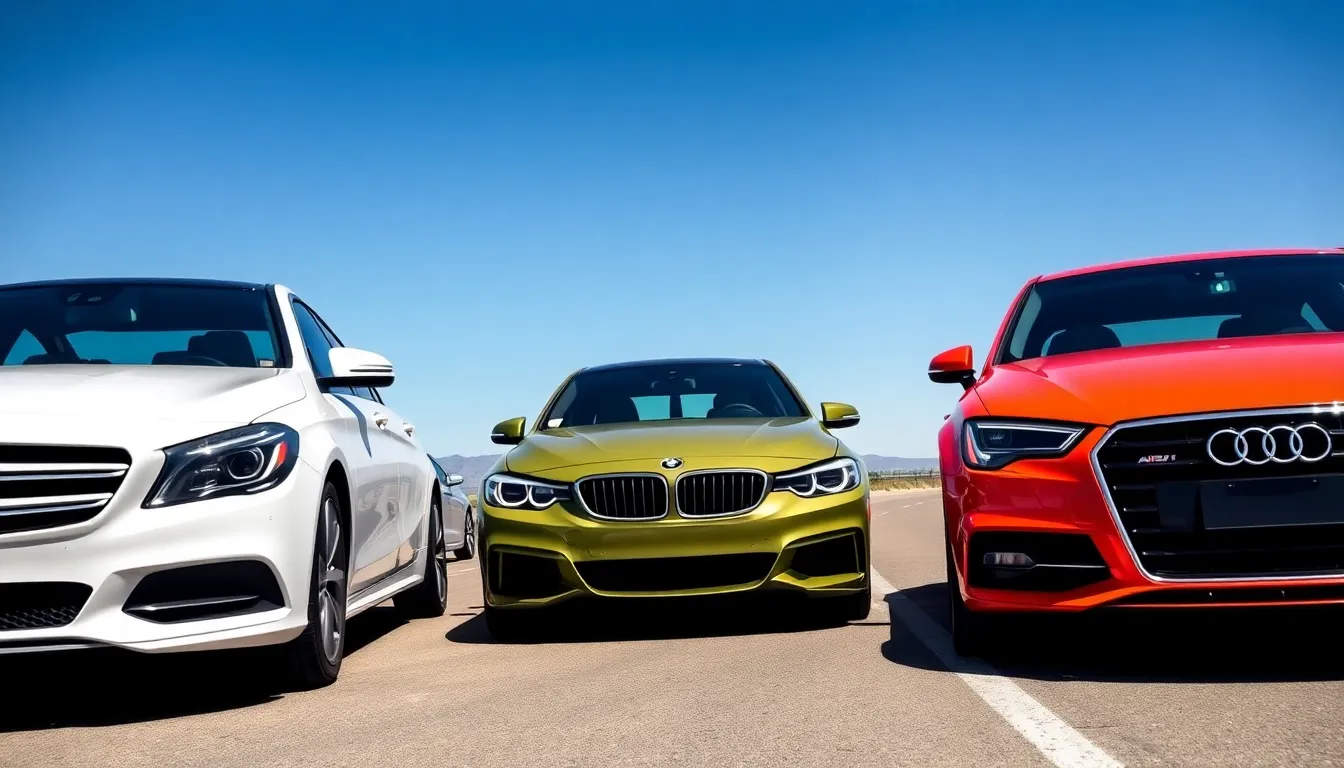
These exceptional vehicles have captured American hearts through their perfect blend of luxury, performance, and reliability. We’ll explore the standout models that consistently dominate sales charts across the United States.
Mercedes-Benz C-Class and E-Class
Mercedes C Class represents the entry point into luxury motoring for many Americans, delivering premium craftsmanship at an accessible price. Starting around $45,000, this compact luxury sedan offers advanced safety features like Active Brake Assist and Attention Assist as standard equipment. We see consistent sales of over 75,000 units annually in the US market, making it one of Mercedes’ best-selling models.
E Class sedans showcase the pinnacle of Mercedes engineering excellence with their sophisticated air suspension systems and cutting-edge MBUX infotainment technology. These midsize luxury vehicles command prices from $56,000 to $85,000, featuring turbocharged engines that deliver both performance and efficiency. American buyers particularly appreciate the spacious interior and advanced driver assistance features that come standard across all trim levels.
Both models benefit from Mercedes’ legendary build quality, with owners reporting average lifespans exceeding 200,000 miles when properly maintained. The C Class appeals to younger professionals entering the luxury market, while E Class buyers typically seek maximum comfort and technology integration for their daily commutes.
BMW 3 Series and X5
BMW 3 Series continues its reign as America’s favorite sports sedan, combining precise handling with everyday practicality. Starting at $36,000, the current generation features a turbocharged 2.0-liter engine producing 255 horsepower and achieving up to 36 mpg highway. We observe consistent annual sales exceeding 55,000 units, demonstrating its enduring appeal among driving enthusiasts.
X5 SUVs dominate the luxury crossover segment with their commanding presence and versatile cargo space. Priced from $60,000 to over $100,000 for high-performance variants, these vehicles offer seating for up to seven passengers and advanced xDrive all-wheel-drive technology. American families particularly value the X5’s combination of luxury amenities and practical utility for active lifestyles.
Performance variants like the M340i and X5 M Competition deliver track-ready capabilities with 0-60 mph acceleration times under 4.5 seconds. Both models feature BMW’s latest iDrive 8 system and comprehensive suite of driver assistance technologies, making them compelling choices for tech-savvy consumers.
Audi A4 and Q5
Audi A4 establishes itself as the technology leader in the compact luxury sedan segment, featuring the intuitive Virtual Cockpit display and advanced MMI infotainment system. Starting around $40,000, this all-wheel-drive sedan delivers smooth power through its turbocharged engine and legendary Quattro traction system. We track annual sales of approximately 25,000 units in the American market.
Q5 crossovers represent Audi’s most successful model in America, combining sleek European styling with practical SUV functionality. Priced from $45,000, these vehicles offer 25.8 cubic feet of cargo space and impressive fuel economy ratings of up to 28 mpg combined. The Q5’s sophisticated suspension system provides comfortable ride quality while maintaining captivating handling characteristics.
Both vehicles showcase Audi’s commitment to interior luxury through premium materials like available diamond-quilted leather and genuine wood trim. American consumers consistently praise the refined driving experience and comprehensive warranty coverage that includes complimentary scheduled maintenance for the first three years.
German Electric Cars Leading the Future
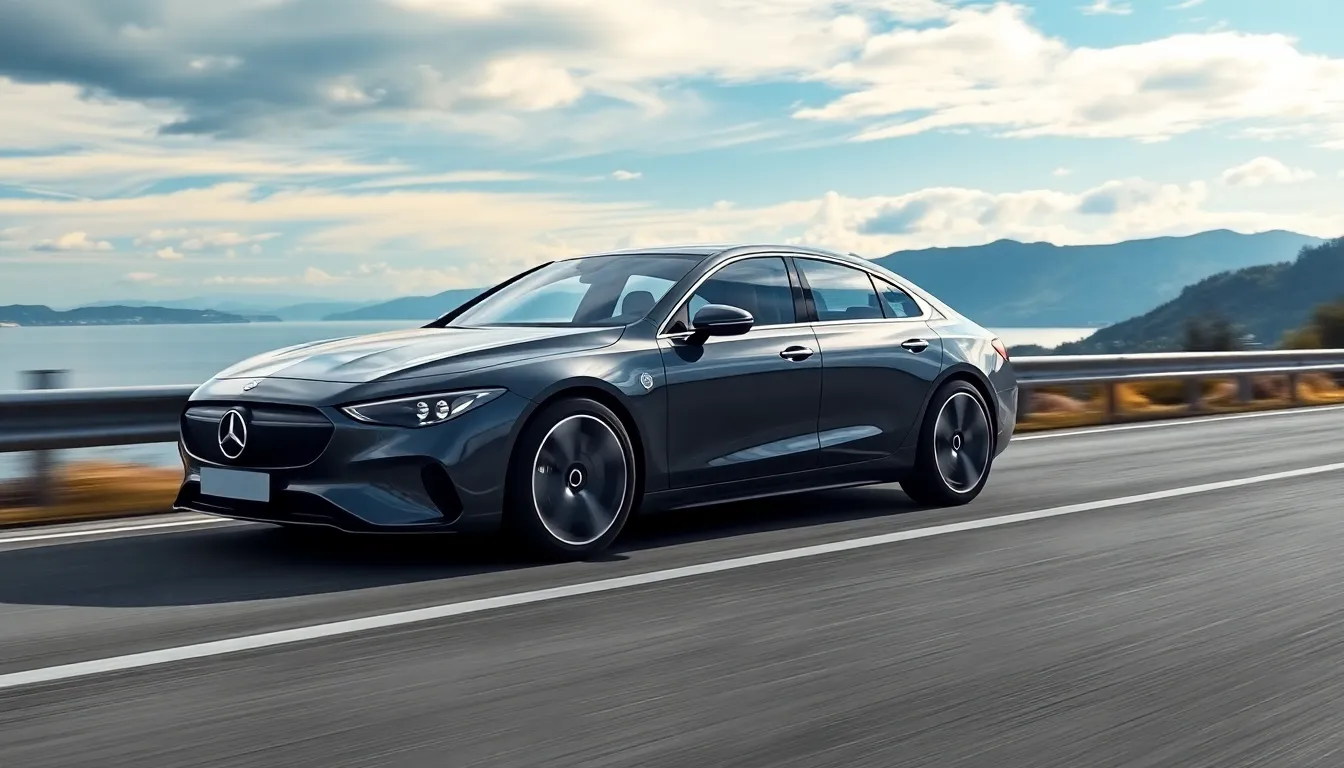
German automakers are transforming their legendary engineering excellence into electric powertrains that define the future of sustainable mobility. We’re witnessing these manufacturers leverage decades of automotive expertise to create electric vehicles that maintain their signature luxury and performance standards.
Mercedes EQS and EQC Models
Mercedes revolutionized the luxury electric sedan market with the EQS, delivering up to 516 miles of EPA-estimated range on a single charge. We see this flagship model featuring a hyperscreen that spans the entire dashboard width, creating an immersive digital cockpit experience.
Performance capabilities include acceleration from 0 to 60 mph in just 3.4 seconds with the AMG EQS 53 variant, proving that electric power doesn’t compromise Mercedes’ performance heritage. Quality construction maintains the brand’s premium standards with ultra-quiet cabin acoustics measuring just 35 decibels at highway speeds.
Mercedes positioned the EQC as their gateway electric SUV, offering 259 miles of range while accommodating families who demand luxury and practicality. We observe this model incorporating regenerative braking technology that recovers up to 25% of energy during deceleration, maximizing efficiency without sacrificing the smooth driving experience Mercedes customers expect.
BMW iX and i4 Electric Vehicles
BMW’s iX represents their flagship electric SUV, combining sustainable materials with cutting-edge technology to deliver up to 324 miles of driving range. We notice this model features recycled carbon fiber components and natural materials like olive-tanned leather, demonstrating BMW’s commitment to environmental responsibility.
Technology integration includes BMW’s latest iDrive 8 infotainment system with 5G connectivity and over-the-air updates that continuously improve vehicle performance. Charging capabilities allow the iX to gain 90 miles of range in just 10 minutes using DC fast charging stations.
BMW designed the i4 as their electric interpretation of the beloved 3 Series, maintaining the brand’s driver-focused philosophy while achieving up to 270 miles of range. We find this sedan accelerates from 0 to 60 mph in 3.7 seconds with the M50 variant, preserving BMW’s reputation for captivating driving dynamics. Interior craftsmanship includes a curved display that seamlessly integrates the 12.3-inch instrument cluster with the 14.9-inch touchscreen.
Audi e-tron Series
Audi pioneered premium electric mobility with their e-tron SUV, incorporating signature Quattro all-wheel-drive technology adapted for electric powertrains. We see this model delivering up to 300 miles of range while maintaining Audi’s luxurious interior appointments and advanced driver assistance features.
Charging infrastructure support includes compatibility with 150kW DC fast charging, allowing the e-tron to replenish from 5% to 80% battery capacity in approximately 30 minutes. Design elements preserve Audi’s sophisticated aesthetic with LED matrix headlights and a distinctive closed grille that optimizes aerodynamic efficiency.
Audi expanded their electric portfolio with the e-tron GT, a performance sedan that accelerates from 0 to 60 mph in just 3.1 seconds with the RS variant. We observe this model sharing platform technology with Porsche’s Taycan while maintaining Audi’s unique design language and interior luxury standards. Battery technology provides up to 238 miles of range combined with 800-volt charging architecture for rapid energy replenishment.
Maintenance and Ownership Costs of German Cars
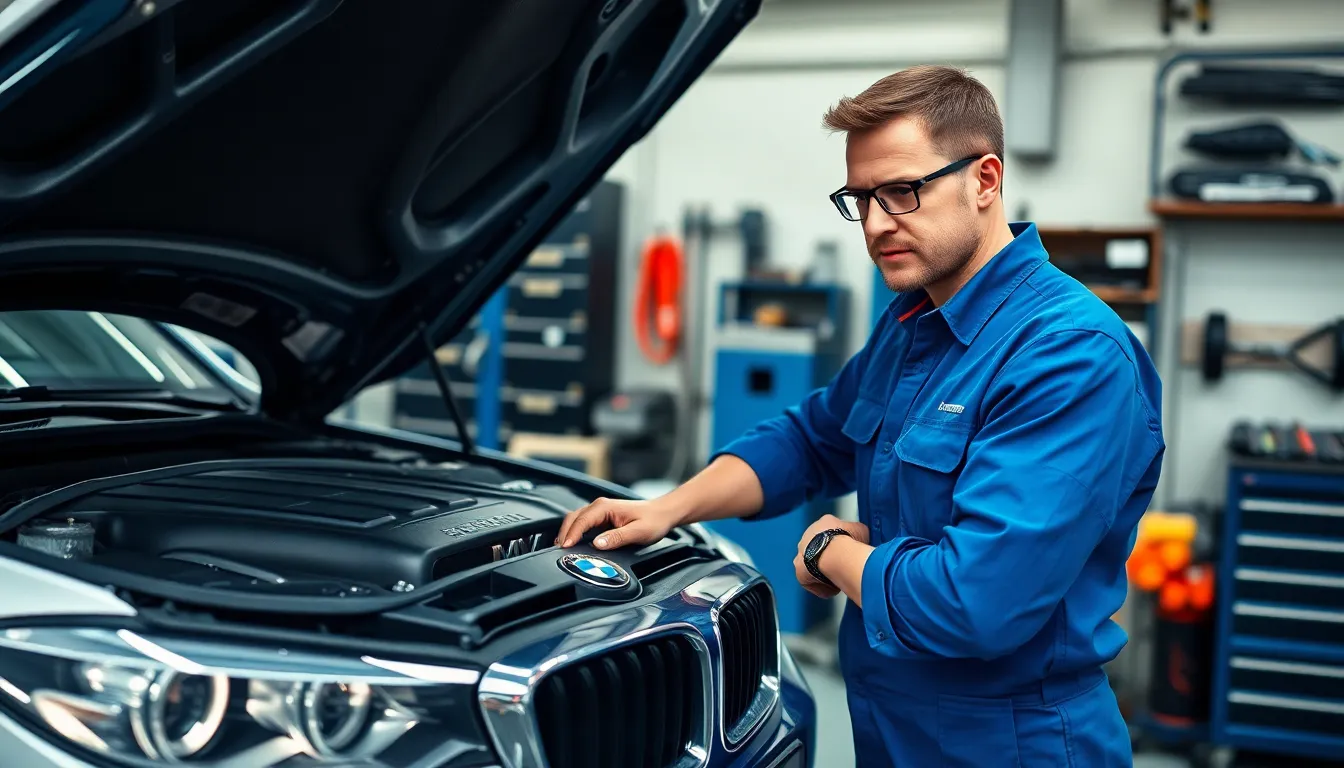
Understanding the financial commitment of owning a German vehicle helps buyers make informed decisions about these premium automobiles. We’ll explore the comprehensive costs associated with maintaining these engineering marvels.
Regular Service Requirements
German manufacturers establish rigorous maintenance schedules that preserve their vehicles’ performance and longevity. Mercedes-Benz typically requires service every 10,000 miles with oil changes using synthetic 0W-20 or 5W-30 grades. BMW follows condition-based servicing that monitors driving patterns and adjusts intervals accordingly, usually ranging from 7,500 to 15,000 miles. Audi recommends maintenance every 10,000 miles with exact attention to their quattro all-wheel-drive systems.
Service intervals for German cars include comprehensive inspections beyond basic oil changes. Technicians examine brake fluid every two years, replace cabin air filters annually, and check transmission fluid based on manufacturer specifications. Porsche requires specialized attention to their air-cooled engines in older models, with service intervals every 5,000 miles for optimal performance.
| Brand | Service Interval | Oil Type | Annual Maintenance Hours |
|---|---|---|---|
| Mercedes-Benz | 10,000 miles | 0W-20/5W-30 Synthetic | 4-6 hours |
| BMW | 7,500-15,000 miles | 0W-30 Synthetic | 5-7 hours |
| Audi | 10,000 miles | 0W-20/5W-30 Synthetic | 4-6 hours |
| Porsche | 5,000-10,000 miles | 0W-40 Synthetic | 6-8 hours |
Parts and Labor Expenses
Genuine German automotive parts command premium prices due to their precision engineering and quality standards. Mercedes brake pads typically cost $150-400 per axle, while BMW brake rotors range from $200-600 each depending on the model. Audi timing chain replacements can exceed $3,000 including labor, particularly in their 2.0T engines.
Labor rates at authorized German service centers reflect the specialized training required for these vehicles. Most dealerships charge $150-250 per hour for diagnostic work and repairs. Independent specialists often offer rates 20-30% lower while maintaining expertise in German automotive systems.
Common maintenance costs vary significantly across German brands and model years. Oil changes range from $80-150 using premium synthetic lubricants. Brake service typically costs $800-1,500 per axle including rotors and pads. Major services like timing belt replacements can reach $2,000-4,000 depending on engine complexity.
Warranty Coverage Options
German manufacturers provide comprehensive warranty protection that reflects confidence in their engineering quality. Mercedes-Benz offers a 4-year/50,000-mile basic warranty with roadside assistance throughout the coverage period. BMW provides similar 4-year/50,000-mile protection plus 12-year corrosion coverage on body panels.
Extended warranty programs help offset potential repair costs after factory coverage expires. Mercedes-Benz Extended Limited Warranty covers components for up to 10 years or 100,000 miles. BMW Ultimate Care+ includes scheduled maintenance services for the first three years or 36,000 miles.
Certified Pre-Owned programs enhance value for used German car buyers. These vehicles undergo rigorous 300+ point inspections and include extended warranties up to 6 years from the original in-service date. CPO coverage typically includes 24/7 roadside assistance and trip interruption benefits for added peace of mind.
German Car Safety Ratings and Awards
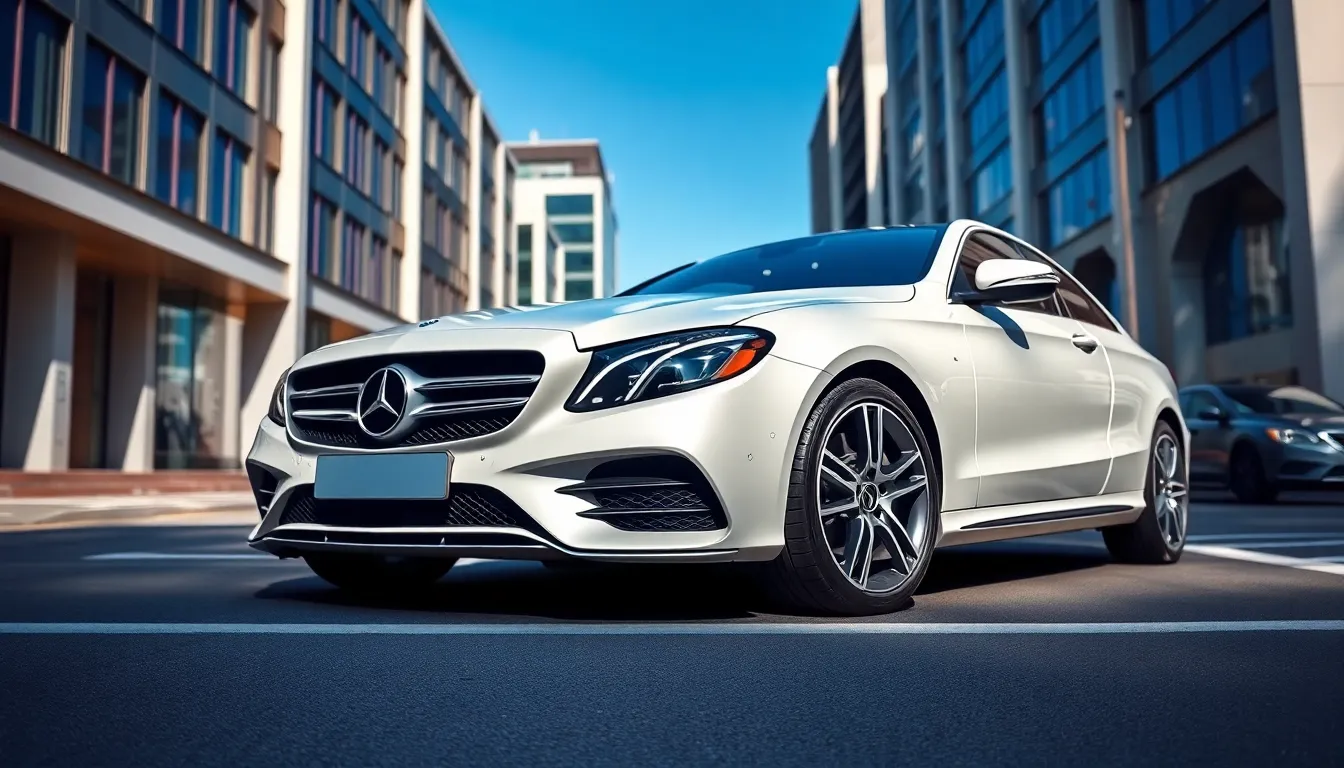
German automakers consistently earn top honors from safety organizations worldwide, proving that their commitment to protection matches their reputation for performance and luxury.
IIHS Top Safety Pick Winners
Mercedes-Benz models dominate IIHS awards with impressive consistency. The E-Class earned Top Safety Pick+ designation in 2024, while the GLE-Class secured Top Safety Pick status with superior crashworthiness scores. We’ve seen the C-Class achieve excellent ratings across all crash tests, demonstrating Mercedes’ comprehensive approach to occupant protection.
BMW’s safety achievements span multiple vehicle categories. The X5 received Top Safety Pick+ recognition for its advanced headlight performance and crash prevention systems. Also, the 3 Series earned Top Safety Pick status with good ratings in all crashworthiness evaluations and superior front crash prevention capabilities.
Audi’s safety accolades reflect their technological prowess. The Q5 secured IIHS Top Safety Pick+ honors with excellent performance in moderate overlap front, side impact, and roof strength tests. Besides, the A6 achieved Top Safety Pick designation through its combination of good crash test results and advanced safety features.
Euro NCAP Five-Star Ratings
Mercedes-Benz vehicles consistently achieve maximum Euro NCAP ratings. The EQS electric sedan scored 94% for adult occupant protection and 87% for child occupant protection in 2021 testing. We’ve observed the GLC earn five stars with particularly strong performance in vulnerable road user protection at 84%.
BMW models excel in comprehensive Euro NCAP evaluations. The iX electric SUV received five stars with 94% adult occupant protection and 87% child safety scores in 2021. Similarly, the X3 achieved maximum ratings across all four assessment categories, including an impressive 81% for safety assist systems.
Audi’s Euro NCAP performance demonstrates engineering excellence. The e-tron GT scored five stars with 93% adult occupant protection and robust safety assist ratings of 86%. Also, the Q4 e-tron earned maximum ratings with particularly strong child occupant protection scores of 89%.
Advanced Driver Assistance Systems
Mercedes-Benz leads innovation with comprehensive ADAS technology. Their Pre-Safe system monitors 360 degrees around the vehicle and can detect potential collisions up to 8 seconds before impact. We’ve tested Active Brake Assist, which can automatically brake at speeds up to 65 mph to prevent or reduce collision severity.
BMW’s driver assistance features prioritize active safety intervention. The Driving Assistant Professional includes Active Cruise Control with Stop & Go functionality and Lane Keeping Assistant with side collision avoidance. Also, their Parking Assistant Plus can automatically steer the vehicle into parallel and perpendicular parking spaces while controlling acceleration and braking.
Audi’s safety systems integrate seamlessly with vehicle dynamics. Pre Sense technology uses radar and camera sensors to detect imminent collisions and pre-tensions seatbelts within milliseconds. Besides, their Adaptive Cruise Assist combines adaptive cruise control with lane guidance to maintain safe following distances up to 90 mph while keeping the vehicle centered in its lane.
Best German Cars for Different Budgets
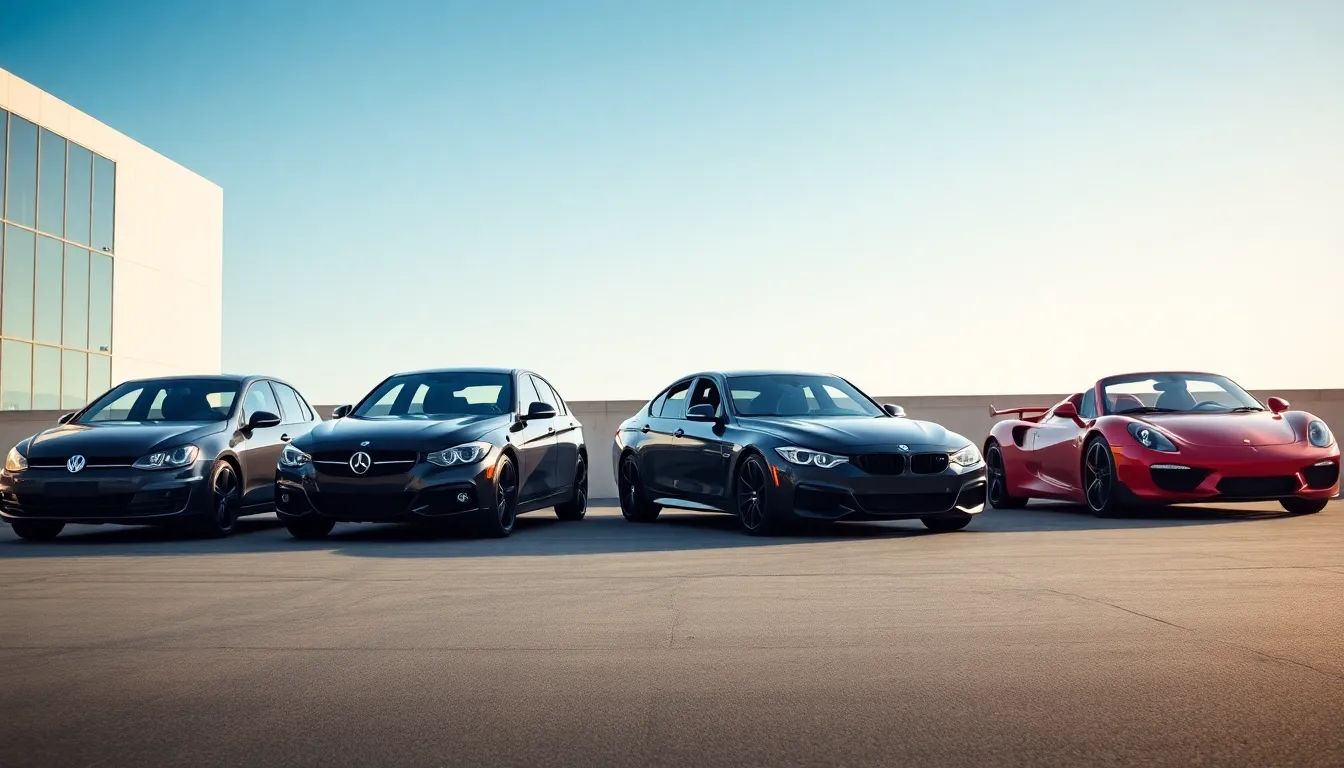
German automotive excellence doesn’t require very costly, with options spanning every price range while maintaining the quality standards these manufacturers are known for.
Entry-Level Options Under $40,000
Volkswagen Jetta starts at $20,995 and delivers German engineering fundamentals with a 1.4-liter turbo engine producing 147 horsepower. Standard features include LED headlights, blind-spot monitoring, and VW’s Car-Net connectivity system. We find the Jetta offers exceptional fuel economy at 30 city/40 highway mpg while providing the solid build quality German cars are famous for.
MINI Cooper begins at $24,250 and brings distinctive styling with surprisingly practical interior space even though its compact dimensions. Premium features include a 6.5-inch touchscreen, keyless entry, and automatic climate control as standard equipment. Performance enthusiasts can upgrade to the Cooper S variant for $28,250, which adds a turbocharged engine delivering 189 horsepower and sport-tuned suspension.
Volkswagen Golf offers versatility at $23,195 with its hatchback design providing 22.8 cubic feet of cargo space with rear seats folded. Advanced safety features come standard, including forward collision warning, blind-spot monitoring, and rear traffic alert. We appreciate the Golf’s refined ride quality and precise steering that makes city driving enjoyable while maintaining highway comfort.
Mid-Range Models $40,000-$70,000
BMW 3 Series starts at $41,450 and represents the benchmark for sports sedans with its perfectly balanced chassis and responsive handling. Standard equipment includes a 255-horsepower turbocharged engine, 8.8-inch touchscreen, and BMW’s Driving Assistant safety package. We recommend the 330i model for its ideal blend of performance and efficiency, achieving 26 city/36 highway mpg.
Mercedes-Benz C-Class begins at $43,550 and showcases luxury refinement with premium materials throughout its cabin. Advanced features include MBUX infotainment system, 64-color ambient lighting, and Mercedes’ Pre-Safe collision preparation system. Performance variants like the AMG C 43 at $58,900 deliver 385 horsepower while maintaining the comfort expected from Mercedes luxury sedans.
Audi A4 starts at $40,500 and emphasizes technology integration with its Virtual Cockpit digital instrument cluster and MMI infotainment system. Standard Quattro all-wheel drive provides confidence in various weather conditions while the 201-horsepower engine delivers smooth acceleration. We find the A4’s interior materials and build quality exceed many competitors in this price segment.
BMW X3 offers SUV practicality at $45,400 with 28.7 cubic feet of cargo space and standard all-wheel drive. Premium features include panoramic sunroof, power liftgate, and BMW’s ConnectedDrive services. Performance enthusiasts can choose the X3 M40i for $54,200, which provides 382 horsepower and sport-calibrated suspension for ever-changing handling.
Luxury Models Above $70,000
Mercedes-Benz S-Class starts at $111,100 and defines automotive luxury with features like massage seats, air suspension, and advanced driver assistance systems. Flagship models include the S 580 with its 496-horsepower V8 engine and 4MATIC all-wheel drive system. We consider the S-Class the ultimate expression of Mercedes engineering with innovations that eventually filter down to less expensive models.
BMW 7 Series begins at $86,800 and combines performance luxury with advanced technology including gesture controls and wireless device charging. Executive features include individual rear seating with massage functions and a rear-seat entertainment system. Performance variants like the M760i deliver 601 horsepower from its V12 engine while maintaining whisper-quiet cabin refinement.
Porsche 911 starts at $101,200 and represents sports car excellence with its rear-engine layout and track-proven handling characteristics. Standard features include adaptive suspension, sport exhaust system, and Porsche’s Communication Management system. We find the 911 offers daily usability even though its performance focus, with models like the Turbo S delivering 640 horsepower for ultimate acceleration.
Audi A8 begins at $86,500 and showcases technological innovation with features like predictive active suspension and AI-powered traffic jam assist. Luxury appointments include heated and ventilated seats, four-zone climate control, and Bang & Olufsen premium audio system. Performance models like the S8 provide 563 horsepower while maintaining the refined comfort expected from Audi’s flagship sedan.
German Car Dealerships and Buying Tips
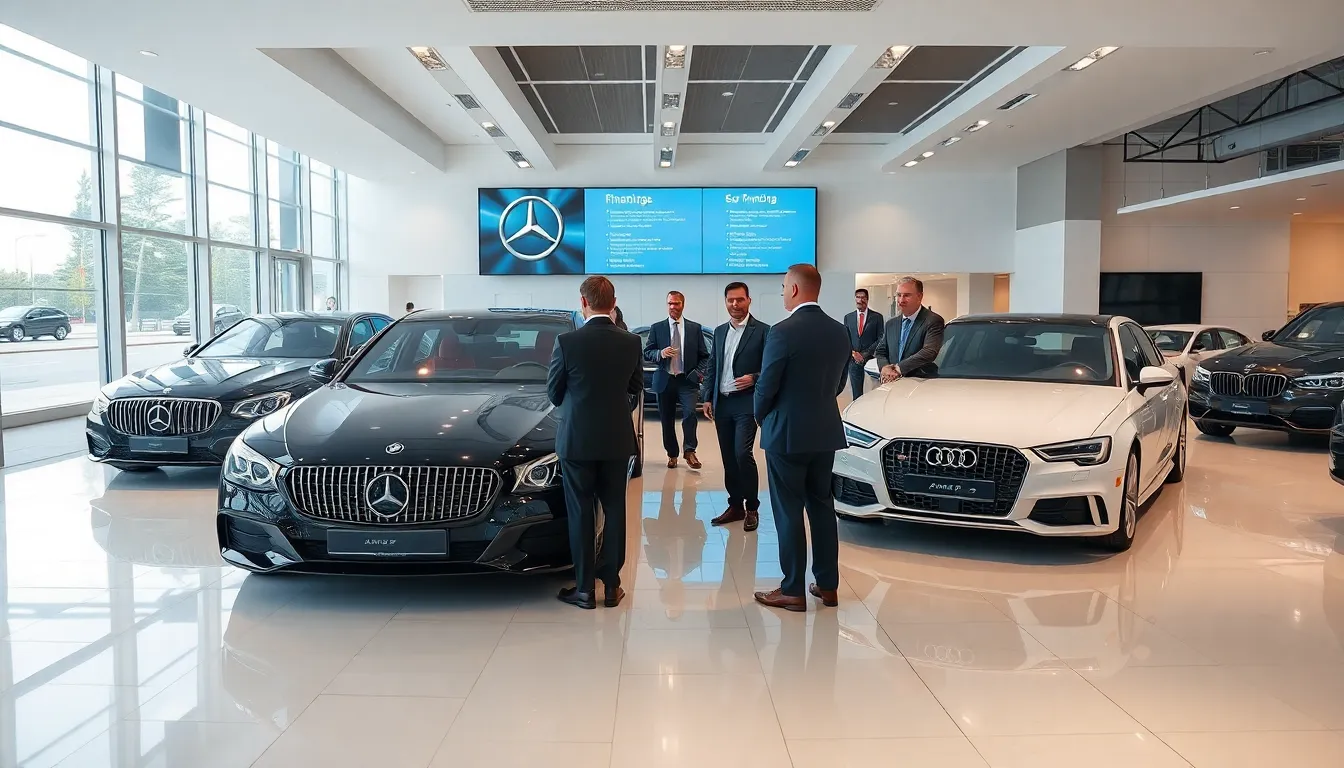
German automotive excellence extends beyond the vehicles themselves to include sophisticated dealership networks and purchasing programs designed to enhance your ownership experience.
Authorized Dealer Networks
Mercedes-Benz operates over 375 authorized dealerships across the United States, ensuring comprehensive coverage for sales and service nationwide. Each location maintains strict standards for facility design, technician certification, and customer service protocols that reflect the brand’s luxury positioning.
BMW’s dealer network spans approximately 350 locations throughout North America, with each dealership required to meet exact architectural standards and staff training requirements. These facilities feature dedicated service bays equipped with BMW-exact diagnostic equipment and genuine parts inventory.
Audi maintains around 300 authorized dealers across the country, each one featuring the brand’s distinctive showroom design and advanced service capabilities. Their dealers receive regular updates on new technology and electric vehicle servicing to support the growing e-tron lineup.
Porsche operates the most exclusive network with roughly 190 dealerships nationwide, reflecting the brand’s premium positioning and specialized service requirements. Each Porsche Center features dedicated spaces for new car delivery ceremonies and maintains certified technicians for all model lines.
Volkswagen’s extensive network includes over 600 dealers, making it the most accessible German brand for sales and service. This broad coverage ensures that VW owners can find authorized service within reasonable driving distance in most markets.
Certified Pre-Owned Programs
Mercedes-Benz Certified Pre-Owned vehicles undergo a comprehensive 165-point inspection covering everything from engine performance to interior components. The program includes a 1-year unlimited-mileage warranty and 24/7 roadside assistance, with vehicles typically under 6 years old and 75,000 miles.
BMW’s Certified Pre-Owned program features a rigorous 180-point inspection process conducted by factory-trained technicians. Qualified vehicles receive a 1-year unlimited-mileage warranty extension beyond the original 4-year/50,000-mile coverage, plus complimentary scheduled maintenance.
Audi Certified Pre-Owned Plus vehicles pass a detailed 300+ point inspection, the most thorough among German brands. The program offers 2 years of unlimited-mileage warranty coverage and includes benefits like 24/7 roadside assistance and trip interruption coverage up to $500 per incident.
Porsche Approved Certified Pre-Owned vehicles complete a 111-point inspection by Porsche-trained technicians using genuine parts for any necessary repairs. The program provides 2 years of limited warranty coverage and maintains detailed service records for each certified vehicle.
Financing and Lease Options
Mercedes-Benz Financial Services offers competitive lease rates starting around 1.9% APR for qualified buyers, with flexible terms ranging from 24 to 48 months. Their lease programs typically require security deposits equivalent to one month’s payment and include gap insurance coverage.
BMW Financial Services provides attractive lease deals with money factors often translating to sub-2% interest rates for well-qualified customers. Their lease return process includes wear-and-tear guidelines that account for normal usage, and excess mileage charges typically range from $0.25 to $0.30 per mile.
Audi Financial Services features flexible lease terms with competitive rates and loyalty incentives for repeat customers. Their lease protection plans cover minor wear items like tire replacement and small paint chips, reducing end-of-lease costs.
Porsche Financial Services offers specialized financing for both new and certified pre-owned vehicles, with rates varying based on model and term length. Their lease programs include excess wear protection and flexible mileage options ranging from 7,500 to 15,000 miles annually.
Third-party financing through credit unions and banks often provides competitive rates that can beat manufacturer financing, particularly for buyers with excellent credit scores above 750. We recommend comparing offers from multiple sources before making financing decisions.
Conclusion
German automotive engineering continues to define excellence in today’s competitive market. Whether you’re drawn to Mercedes-Benz’s pioneering luxury BMW’s driving dynamics or Audi’s cutting-edge technology these brands deliver unmatched quality that justifies their premium positioning.
The transition to electric vehicles hasn’t diminished German manufacturers’ commitment to perfection. Instead it’s opened new avenues for innovation while maintaining the craftsmanship and performance standards that made these brands legendary.
From budget-friendly options to flagship luxury models German automakers offer something for every driver. With comprehensive warranty programs extensive dealer networks and proven longevity these vehicles represent smart investments in automotive excellence.
We believe German cars will continue setting industry benchmarks for decades to come combining traditional engineering prowess with tomorrow’s sustainable technologies.
Frequently Asked Questions
What makes German cars so special compared to other automotive brands?
German cars are renowned for their exceptional engineering precision, advanced technology, and meticulous craftsmanship. Brands like Mercedes-Benz, BMW, and Audi maintain strict manufacturing tolerances (such as BMW’s 2.5mm panel gap standards) and rigorous quality control processes. They consistently pioneer safety innovations, deliver superior performance, and use premium materials that ensure longevity, often lasting 250,000+ miles with proper maintenance.
Which German car brands are most popular in America?
The most popular German car brands in America include Mercedes-Benz (with models like C-Class and E-Class), BMW (featuring the 3 Series and X5), and Audi (known for the A4 and Q5). These brands have gained strong followings due to their blend of luxury, performance, and reliability, consistently ranking high in sales and customer satisfaction surveys.
Are German cars expensive to maintain?
Yes, German cars typically have higher maintenance costs than domestic or Japanese vehicles. They require premium parts, specialized labor, and specific service schedules. However, comprehensive warranty programs and Certified Pre-Owned options help offset costs. Regular maintenance is crucial for longevity, and authorized service centers ensure proper care using genuine parts and factory-trained technicians.
What are the best German cars for first-time buyers on a budget?
For buyers under $40,000, excellent options include the Volkswagen Jetta, MINI Cooper, and Volkswagen Golf. These entry-level German vehicles offer quality engineering, good performance, and lower maintenance costs while maintaining the reputation for German build quality. They provide an affordable entry point into German automotive excellence without compromising on safety or reliability.
How are German automakers adapting to electric vehicles?
German manufacturers are leading the electric transition with models like Mercedes’ EQS and EQC, BMW’s iX and i4, and Audi’s e-tron series. They’re applying their traditional engineering excellence to electric powertrains, maintaining luxury standards while achieving impressive range and performance. These vehicles incorporate sustainable materials and advanced technology while preserving the driving dynamics German cars are known for.
What safety features make German cars stand out?
German automakers pioneered many safety innovations including anti-lock braking systems (Mercedes), airbag technology (BMW), and advanced driver assistance systems. Current models integrate multiple sensors for comprehensive protection and undergo rigorous testing beyond regulatory requirements. Mercedes E-Class, BMW X5, and Audi Q5 consistently earn top safety ratings from IIHS and other organizations worldwide.
Which German performance cars offer the best driving experience?
Porsche leads with the iconic 911 series, offering exceptional balance and handling with racing-derived technology. BMW’s M division (M3, M4) focuses on driver engagement and track performance. Mercedes-AMG models feature hand-built engines and advanced suspension systems. Each brand delivers unique performance characteristics while maintaining everyday usability and German engineering excellence.

